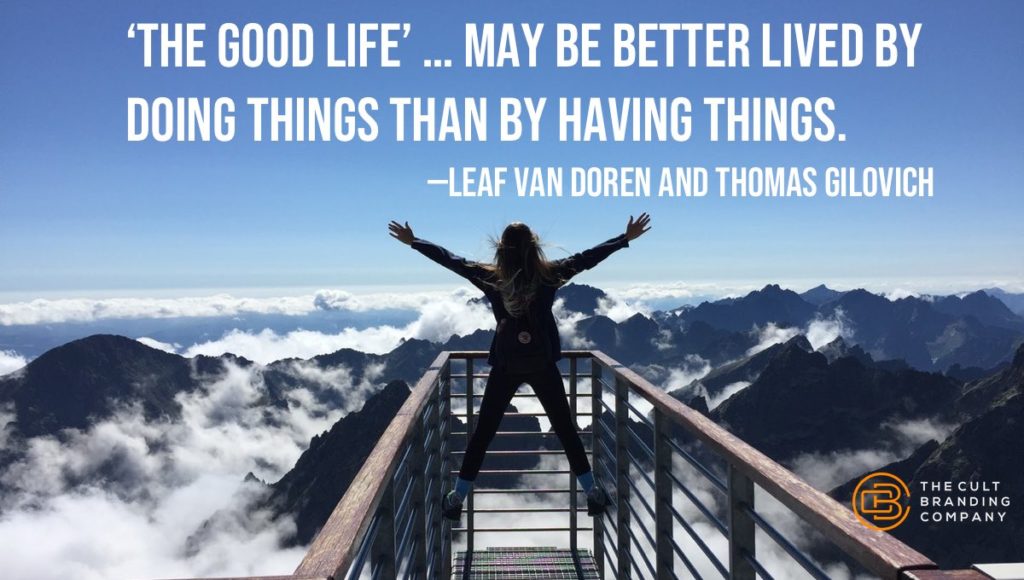
Marketers have asked the perennial question: What makes customers happy?
Cult Brands have already cracked the code. By definition, Cult Brands sell lifestyles and provide opportunities for their brand lovers to make experiential purchases. When you’re buying a Harley, you’re not only purchasing a material good, you’re also buying into the lifestyle personified by freedom on the open road. By participating in HOG rallies, bikers create a rich scrapbook of memories in their minds that they can always return to, time and time again.
What are some of the happiest moments of your life? You might recall the backpacking trip you took through Central America, forgoing a travel itinerary, and following the muse wherever she took you. When you remember all of the fellow backpackers you met along the way and roaming off the beaten track to experience the local culture, you can’t help but smile.
Fun memories of a summer camping trip might also come into focus, with days spent fishing and hiking, and late-night talks around the campfire with a group of your closest friends. It’s these types of experiences, magical moments you could say, that enrich our souls and our spirits.
Material Possessions versus Experiences
Psychologists Leaf Van Boven of the University of Colorado at Boulder and Thomas Gilovich of Cornell University took an empirical approach to examine the question: What makes people happier: material possessions or experiences?1
The researchers compared experiential purchases, those made with the primary intention of acquiring life experiences or an event to live through, with material purchases, those made with the primary intention of acquiring a material good or a tangible possession.
In a self-report survey, participants who were asked to evaluate an experiential purchase reported feeling happier compared to those asked to evaluate a material purchase. These findings were supported by results from their laboratory experiment. Participants were asked to describe a recent experiential or material purchase, after which they rated their current feelings. One week later, they were asked to read their description, think about the purchase, and rate their feelings again. Participants in the experiential purchase condition reported that thinking about their purchase made them happier than did participants in the material purchase condition.
Van Boven and Gilovich explain, “‘The good life’ … may be better lived by doing things than by having things.” Experiences, rather than possessions, tap into a reservoir of deeper personal meaning. For example, going to the opera or visiting an art museum may be associated with higher-level pursuits, such as intellectual stimulation and cultural growth. With material possessions, you may feel momentary satisfaction after buying a new shirt, but the positive feeling quickly dissipates after a few wears.
The Power of Experience
For one, the researchers explain that these experiential purchases tend to be more open to positive reinterpretations. Even if your trip to Disney World was dampened by a rainy day, the memory of that experience is malleable over time. In hindsight, families may remember the creative ways they were able to enjoy themselves despite the lousy weather. In the words of one survey participant, “Material possessions, they sort of become part of the background, experiences just get better with time.”
Secondly, experiential purchases are more meaningful parts of one’s identity. Van Boven and Gilovich explain, “Experiences can provide greater hedonic value because they contribute so much more to the construction of the self than material possessions.” With this perspective, we may define ourselves by the experiences that we have, rather than by the clothes we wear or the car we drive.
Finally, experiences have greater “social value.” The story about your expedition through the wilderness is vastly more pleasurable to talk about, and more interesting for others to hear, than the suit you purchased at Armani. The sharing of personal experiences can help foster social relationships because the likeability factor in these types of exchanges is higher.
It’s the experience of meaningful events, filed deep in the recesses of your mind that have staying power. Unlike material goods, these experiential purchases don’t lose their luster or their wearability over time. Like a fine wine, the associated memories improve with age.
Is your company only in the business of selling products and material possessions? Leverage your brand by offering experiential purchases, and creating experiences that the customer will remember, enjoy, and talk about, for years to come.
_______________________
